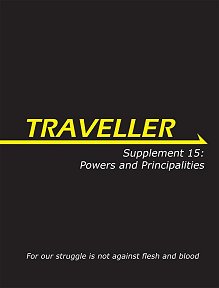
This is a fascinating and thought-proking collection of ideas and resources to help in world design, looking as it does at three key areas that the party is likely to interact with on any planet visited: governments, corporations and religions.
First, corporations. You have to buy their stuff, you might get hired by them, if you are lucky enough to have spare credits you might even invest in them. It comes in two layers: information which is available publically and that which is not widely known (and hence, at least initially, for the Referee only). Some of the latter can be researched or otherwise discovered. There are also ideas for plotlines involviing the corporation in question, just in case the information presented about it hasn't spawned a few ideas already.
Each corporation is also given a Universal Corporate Profile, a hexadecimal string that gives basic information about it in the same way as UWPs (and indeed UPPs) work. The information includes 'allegiance' - basically, in which jurisdiction it is based - as well as number of employees, how wide-spread it is, gross annual revenue and how risky it is as an investment. (Remember Dunn & Bradstreet ratings? That kind of assessment.) Further digits give influence, public image, type of ownership, industrial classification and the style in which it operates - how much R&D they do, how traditional they are, how centralised are their operations and even how much dissent there is in the boardroom. (I'm beginning to think this would be a useful way to classify real-world corporations too...) There's even a couple of ratings for how they treat employees (and what said employees think of their employers). The whole UCP is given a detailed explanation with some worked examples and a worksheet for doing your own before we get to look at the actual list of corporations.
The corporations given here are divided into different sections, beginning with the catch-all of 'Administration' - everything from firefighters to whole planets run as a single corporation and privatised tax collectors... plenty of scope to mess with the party as they interact with corporate workers with a completely different outlook on how things should be done. Next is Agriculture, followed by Construction, Finance (including Insurance and Real Estate), Manufacturing (of a whole profusion of products), Mining, Service Industries, Trade, and Transport (including Communication and Utilities).
For those who enjoy a sly giggle, look out for gems like the game manufacturer Far Past Enterprises or Gridlore Technologies with their penguin logo, in-jokes by and for those who have been playing Traveller since its inception.
The next section deals with Corporate Scheming and is repleate with ideas for whole campaigns never mind adventures. To make it all sound good there's a glossary of business terms as well.
Whether they like it or not, everyone has to deal with governments - their own and those of places that they visit. The latter can often prove awkward as they may have strange rules that you are unaware of... until you fall foul of them. This section is ordered according to the government codes in a UWP, and goes to prove that each category still allows for a great diversity of government styles and types. Again, there are plot ideas a-plenty, as well as those that you will have as you read the descriptions.
Finally come the Religions. Whilst the Imperium promotes religious tolerance - everyone may worship in any way they see fit provided it does not threaten the peace and security of other systems - religions themselves, when met on 'home turf', may not be anywhere near as tolerant. So it doesn't matter what the characters' own views are on the subject, they are likely to have to interact and cope with all kinds of weird beliefs and customs on their travels.
Religions are classified by broad groups of belief system - Animism, Dualism, Monotheism and a range of other styles - each with several examples. Every example comes with public knowledge, Referee notes and at least one plot idea. If you find it hard coming up with religions that don't have at least some elements of real-world ones, this is a treasure trove - apart from one which is derived from Judaism none have fallen into this trap.
Overall this is an excellent resource for embedding adventure into the everyday tapestry of commerce, government and faith: things which likely loom large in the minds of the inhabitants of every system the party visits.
Return to Supplement 15: Powers and Principalities page.
Reviewed: 24 January 2014

